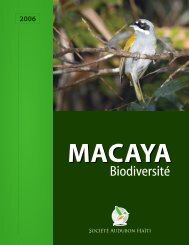Bwa-yo - Société Audubon Haiti
Bwa-yo - Société Audubon Haiti
Bwa-yo - Société Audubon Haiti
You also want an ePaper? Increase the reach of your titles
YUMPU automatically turns print PDFs into web optimized ePapers that Google loves.
Pests and Diseases 171<br />
Species: Laguncularia racemosa (L.) Gaertn. f.<br />
Creole Name: mang blan<br />
Family: Combretaceae<br />
Insect Pests: A wood borer (Sphaeroma terebrans Bate) attacks trees in Florida. A beetle<br />
(Chrysobothris tranqueborica Gmelin.) and a borer (Psychonoctua personalis<br />
Grote) attack trees and cause mortality in Puerto Rico.<br />
Reference: Jimenez, 1985a.<br />
Species: Leucaena diversifolia (Schlecht.) Benth. subsp. diversifolia<br />
Creole Name: lisina ti fey<br />
Family: Fabaceae (=Leguminosae)<br />
Insect Pests: The coffee bean weevil (Araecerus fasciculatus De Geer) and an undetermined<br />
moth species attack seeds in the Philippines, feeding on the seed cotyledon<br />
and seed coats.<br />
Reference: Brazza, 1988b.<br />
Species: Leucaena leucocephala (Lam.) de Wit<br />
Creole Names: lisina, delen, madlenn<br />
Family: Fabaceae (=Leguminosae)<br />
Insect Pests: The nymph of the psyllid (Heteropsylla cubana Crawford) attacks <strong>yo</strong>ung<br />
shoots that die back in <strong>Haiti</strong> and causes considerable damage throughout SE Asia. Natural<br />
enemies, both parasitic and predatory, keep psyllids from reaching epidemic levels in the<br />
Caribbean. Lepidopteran larvae (Heliothis zea) defoliate <strong>yo</strong>ung trees in Puerto Rico. Mealy<br />
bugs (Pseudococcus citri Risso and Ferrisia virgata Ckll.) feed on seed pods in Indonesia<br />
and the Philippines. A twig girdler (Oncideres rhodosticta) attacks trees in Texas. The coffee<br />
bean weevil (Araecerus fasciculatus De Geer) attacks seeds in the Philippines, feeding<br />
on the cotyledon. Other insect pests ofthe Philippines include: the scarab beetles (Anomala<br />
sp., Adoretus sp., and Holotrichia sp.) that feed on seedling roots; coleopteran and lepidopteran<br />
stem borers, including Zeuzera coffeae and Cossus sp.; lepidopteran defoliators<br />
(Orgyia australis postica, Lymantria sp.); an undetermined microlepidopteran species that<br />
feeds on the cotyledons and seedcoats of seeds inside pods; Gryllotalpa africana<br />
(Orthoptera: Gryllotalpidae) and Phaneroptera furcifera (Orthoptera: Tettigoniidae) that<br />
feed on the roots and flowers, respectively; an undetermined diaspidid (Homoptera:<br />
Diaspididae) that sucks sap from seedling stems and leaves, causing defoliation; and a burrowing<br />
cydnid (Hemiptera: Cydnidae) that sucks sap from the roots.<br />
Other Pests: The Hispaniolan Woodpecker (Melanerpes striatus) and Yellow-bellied<br />
Sapsucker (Sphyrapicus varius) wounds the bark to feed on insects and sap, usually at<br />
the crown base.<br />
Diseases: Leaf spot (Exosporium leucaenae EL. Stevens & Dalby) occurs in Puerto<br />
Rico. Leaf pustules caused by Camptomeris leucaenae (EL. Stevens & Dalby) Syd. has<br />
been reported in Puerto Rico, Dominican Republic, Colombia, and Venezuela. Dieback<br />
(Botr<strong>yo</strong>sphaeria ribis var. chromogena Shear, Stevens & Wilcox and Phylsalospora<br />
obtusa (Schw.) Cke.) affects branches in Hawaii. Seed pod rot includes the following<br />
fungi: Colletotrichium gloeosporioides (Penzig) Penzig & Sacco occurs in Mauritius;<br />
Pseudomonas fluorescens and Fusarium sp. occurs in Colombia. Root rot includes the<br />
following fungi species: Fomes lamaoensis (MuIT.) Sacco & Trott, Helicobasidium compactum<br />
Boed., Rosellinia arcuata Petch, R. bunodes (Berk. & Br.) Sacco and Ustulina



